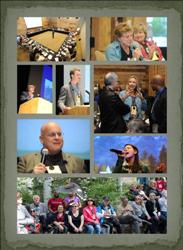 Today, the United States faces numerous challenges in creating job growth and competing in the global economy. However, history has shown that economic downturns often pave the way for unprecedented opportunities in entrepreneurship and innovation. The 2012 National Arts Policy Roundtable topic, Leveraging the Remake: The Role of the Arts in a Shifting Economy, proposed that the arts can serve as both a model and catalyst for change for a number of the pressing societal challenges which face our nation. In the process, we were reminded again that challenge is really just another name for opportunity.
Today, the United States faces numerous challenges in creating job growth and competing in the global economy. However, history has shown that economic downturns often pave the way for unprecedented opportunities in entrepreneurship and innovation. The 2012 National Arts Policy Roundtable topic, Leveraging the Remake: The Role of the Arts in a Shifting Economy, proposed that the arts can serve as both a model and catalyst for change for a number of the pressing societal challenges which face our nation. In the process, we were reminded again that challenge is really just another name for opportunity.
The 2012 Americans for the Arts National Arts Policy Roundtable convened on September 27–29, 2012 at the Sundance Resort and Preserve in partnership with the Sundance Institute. Its participants, who came from a variety of sectors, gathered to discus ways in which the arts can assist individuals and communities—working in partnership with foundations, business, and government entities—to develop locally based solutions.
Our goal was to generate specific, actionable policy recommendations—and to extend them to the appropriate leaders in both the public and private sectors. The following recommendations are the result, and action toward change has already begun:
-
Understand our nation’s demographic changes and build partnerships across the breadth of diverse America, including ethnic, gender, age, preference, income, and all kinds of diversity
-
Give artists the tools and training to be leaders in their communities and part of the brain trust that helps the country move forward in this new economy.
-
Better utilize design thinking in problem-solving for communities and for the arts themselves.
-
Develop a consistent “brand” message for the multiple values of the arts, so when we do speak to decision-makers and stakeholders we speak with a common voice.
-
Convene a national dialogue around technology and how it can be better utilized by the arts and involve creators of technology, funders, artists, curators and policy leaders.
-
Create a central database for the research and case-making information about the arts and categorize it easily, including economy, education, society, quality of life, and more.
-
Establish a searchable online database for cultural tourism opportunities in America.
-
Study the viability and potential options for at-risk legacy organizations.
- Identify outstanding success stories in the arts and arts education and create a best-practices guide.
We are pleased to share with you the full results of our efforts at the 2012 Americans for the Arts National Arts Policy Roundtable. It is our hope that through ongoing conversations and commitment to making a difference, the work of artists who strive to improve the fabric of society will continue to be better understood, nurtured, and advanced.
- Full Report (PDF, 3.2 KB)
- Briefing Book (PDF, 973 KB)
- Participants (PDF, 288 KB)
Americans for the Arts gratefully acknowledges the Ruth Lilly Fund of Americans for the Arts and our partner, the Sundance Institute, for support of the 2012 National Arts Policy Roundtable.






